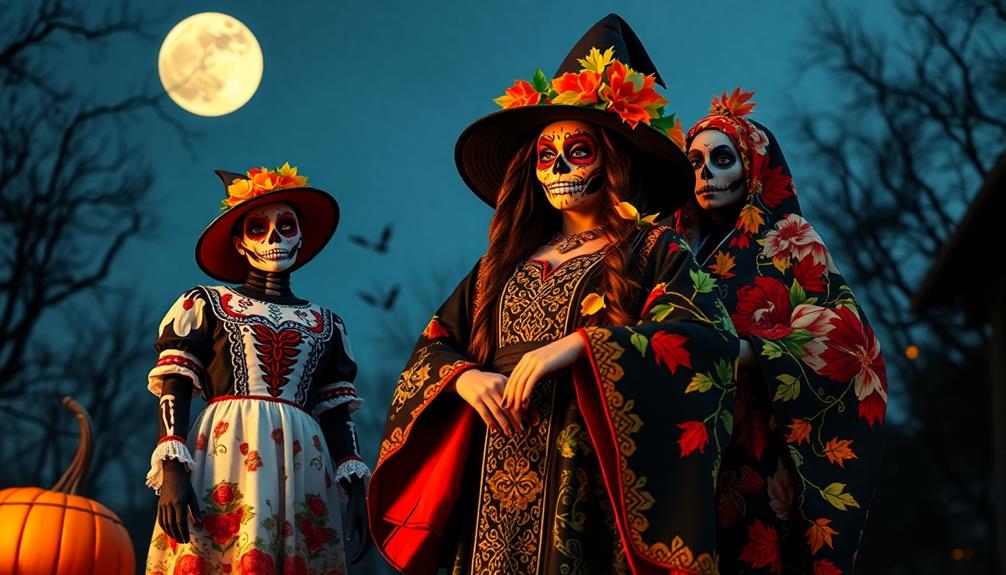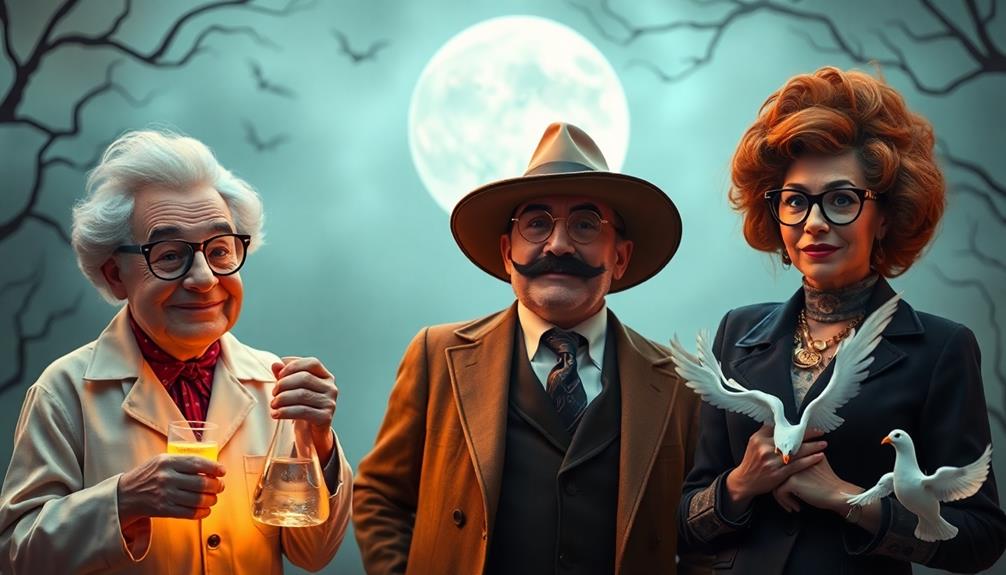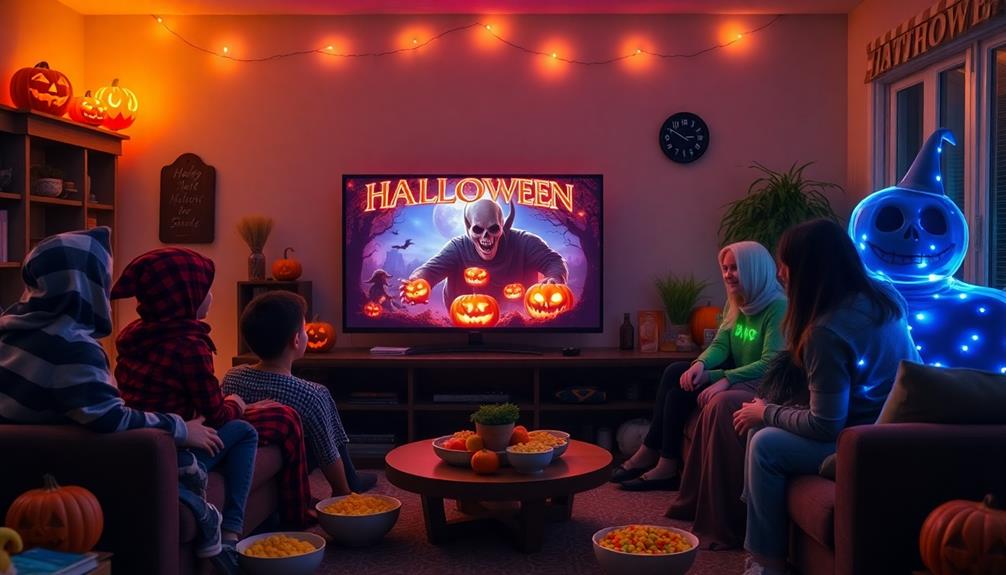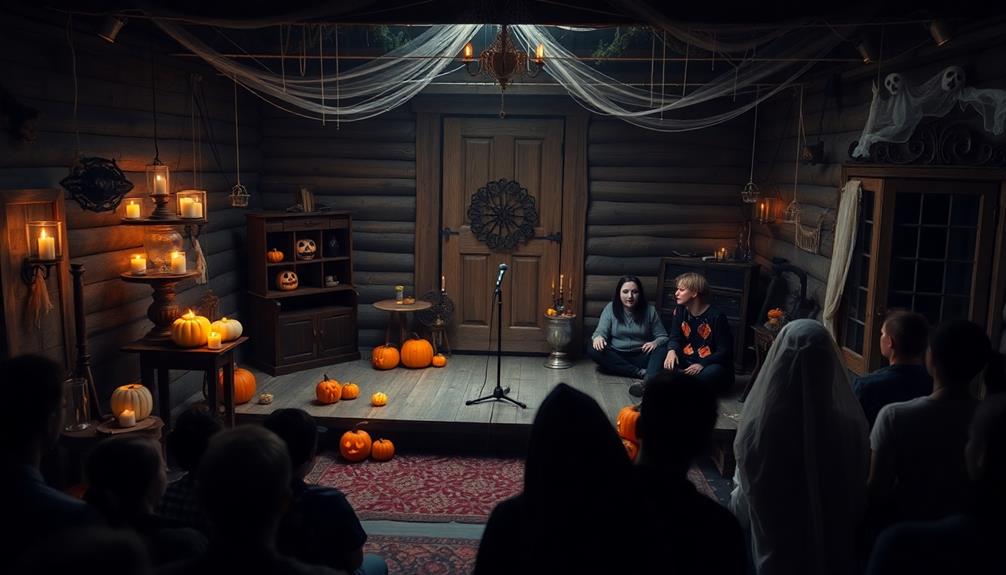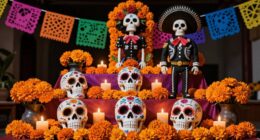To incorporate your heritage into your Halloween costume, start by researching your cultural background and traditional attire. Focus on authentic elements like symbols, colors, or patterns that represent your culture. DIY costumes not only enhance originality but also allow you to express personal stories. Engage family members, especially elders, to share insights about meaningful symbols and folklore characters. Avoid cultural appropriation by respecting the significance of what you choose and steering clear of stereotypes. This thoughtful approach fosters appreciation and respect for your heritage, creating a meaningful costume. There's plenty more to explore about honoring your background stylishly.
Key Takeaways
- Research your cultural heritage and traditional attire to ensure respectful and authentic representation in your costume.
- Incorporate meaningful symbols, colors, or folklore characters from your heritage into your Halloween costume.
- Engage family members, especially elders, to learn about personal stories and cultural significance behind costume elements.
- Create a DIY costume to express your heritage, avoiding commercialized versions that may misrepresent your culture.
- Educate others about your cultural background through costume storytelling, highlighting historical figures or traditional tales.
Understanding Cultural Sensitivity
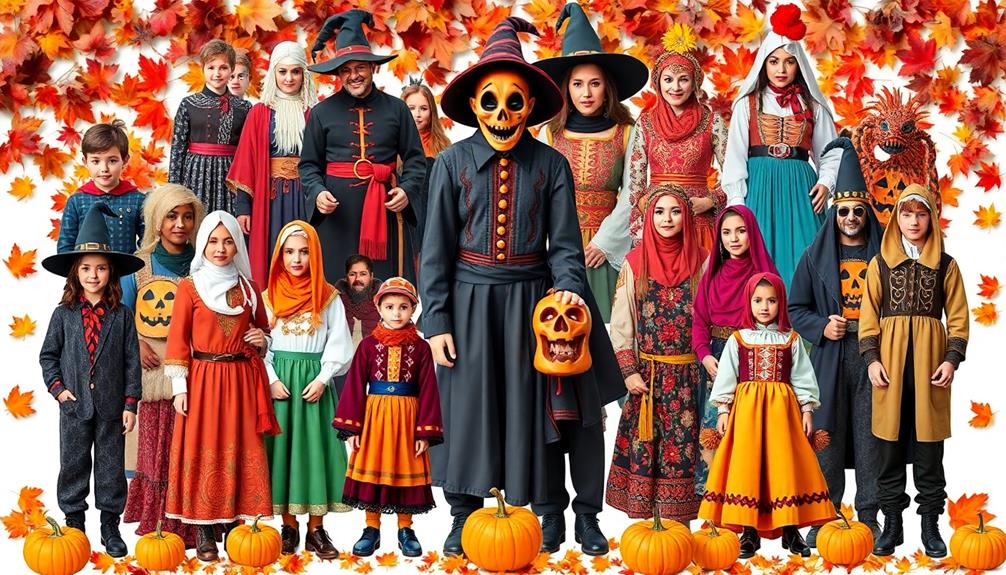
Culturally sensitive costume choices are essential during Halloween and other celebrations. When you pick a costume, it's vital to recognize the historical and social significance of cultural symbols. Many costumes can unintentionally trivialize or exploit these elements, leading to misunderstandings and offense.
Cultural appropriation happens when you adopt aspects from a marginalized culture without grasping their meaning, often perpetuating harmful stereotypes. To avoid this, take the time to research the context behind cultural attire. You wouldn't want to wear something that mocks or misrepresents significant traditions and practices.
For instance, skin painting to mimic another race, as seen with blackface or brownface, is universally unacceptable. Such actions reinforce negative stereotypes and contribute to societal harm.
Researching Your Heritage
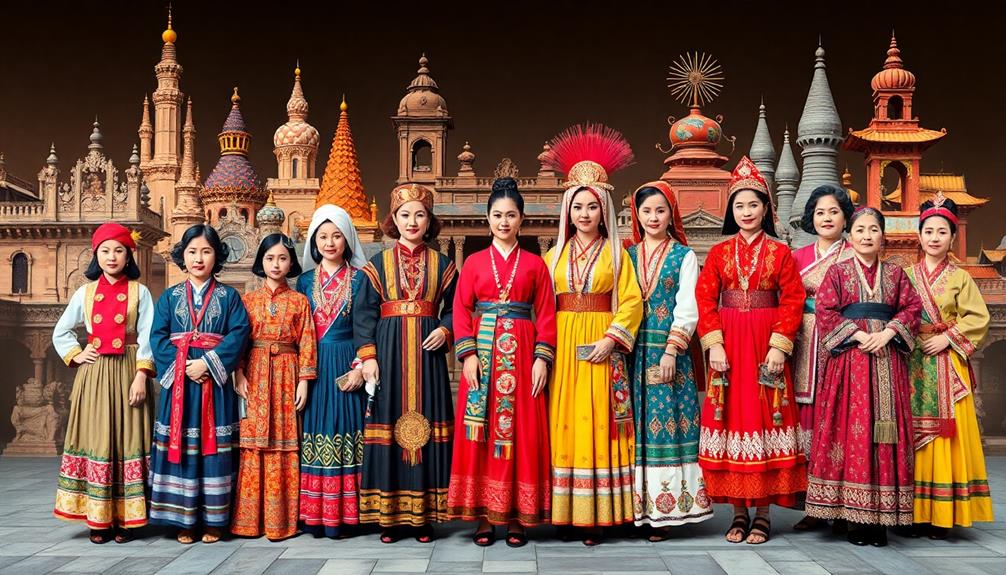
Diving into your heritage can be an enriching journey that not only informs your Halloween costume choices but also deepens your connection to your roots.
Start by researching your heritage through genealogy websites or family records. These resources can help you identify cultural traditions and significant symbols that represent your background.
Next, utilize library resources or online databases to access books and materials that shed light on traditional attire, folklore, and customs associated with your culture.
Engaging with community organizations or cultural centers can also be invaluable; they often host events or workshops that deepen your understanding of cultural practices.
Don't overlook the wisdom of your family. Consider interviewing family members, especially elders, to gather personal stories and experiences that can enrich your costume choice.
Finally, make certain to research the historical context and significance of specific elements related to your heritage. This not only guarantees respectful representation in your Halloween costume but also enhances your appreciation of your cultural roots.
Choosing Authentic Elements

When selecting authentic elements for your Halloween costume, it's crucial to focus on symbols and attire that genuinely reflect your heritage. Start by researching traditional clothing or accessories that hold personal significance and respect their cultural meanings. Understanding the historical context of these elements guarantees you're representing your background accurately and respectfully.
Additionally, consider how Montessori principles can inspire creativity in your costume design, allowing for imaginative expression while honoring your roots.
Consider incorporating aspects of your heritage's mythology or folklore. Characters from traditional stories or local legends can provide a meaningful way to honor your cultural background in your Halloween costume. This not only adds depth but also showcases the richness of your heritage.
A DIY approach is ideal for creating a costume that reflects your roots. By crafting your attire, you avoid commercialized versions that often lack authenticity. Engaging with family members or community elders can also provide invaluable insights into authentic elements of your heritage.
They can share stories and details that inspire your costume choices, fostering a deeper connection to your roots.
Avoiding Cultural Appropriation
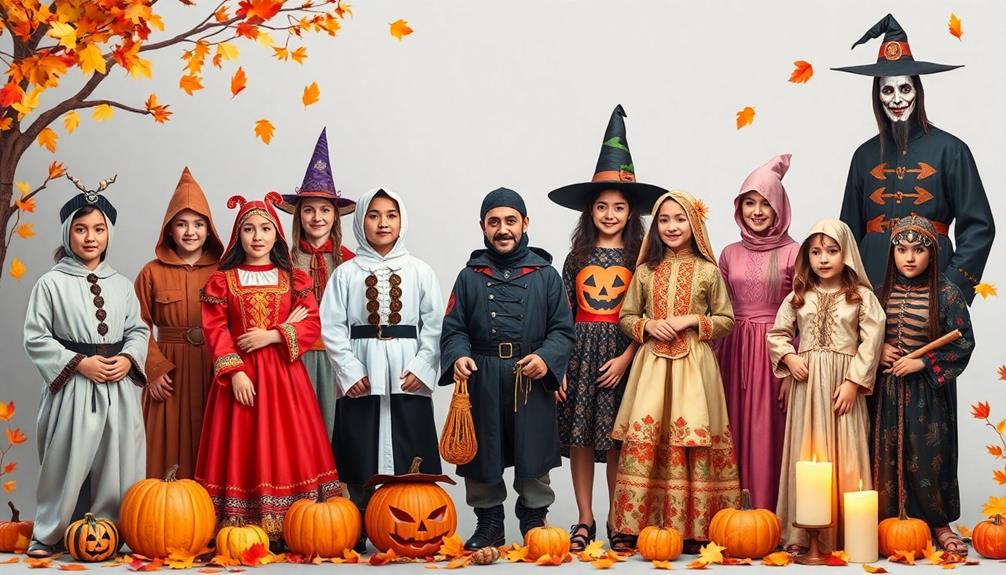
Avoiding cultural appropriation is essential for creating respectful and meaningful Halloween costumes. Cultural appropriation occurs when you adopt elements from another culture without understanding their significance, often leading to trivialization. Costumes that mimic marginalized groups, like Native American headdresses, can perpetuate harmful stereotypes and historical dehumanization.
To guarantee your costume is respectful, engage in cultural appreciation through thorough research. Understand the origins and meanings of cultural symbols, ensuring your choices don't exploit or misrepresent those cultures. Many people find culturally insensitive costumes offensive, prompting a growing call for awareness around this issue.
Here's a quick guide to help you navigate this sensitive topic:
| Dos | Don'ts |
|---|---|
| Research cultural significance | Use stereotypes of marginalized groups |
| Celebrate fantasy or folklore | Mimic traditional attire |
| Consult with cultural representatives | Assume all cultures are the same |
| Choose universal symbols (like ghosts) | Take cultural elements out of context |
| Promote understanding and respect | Disregard the impact of your choices |
Creative Costume Ideas
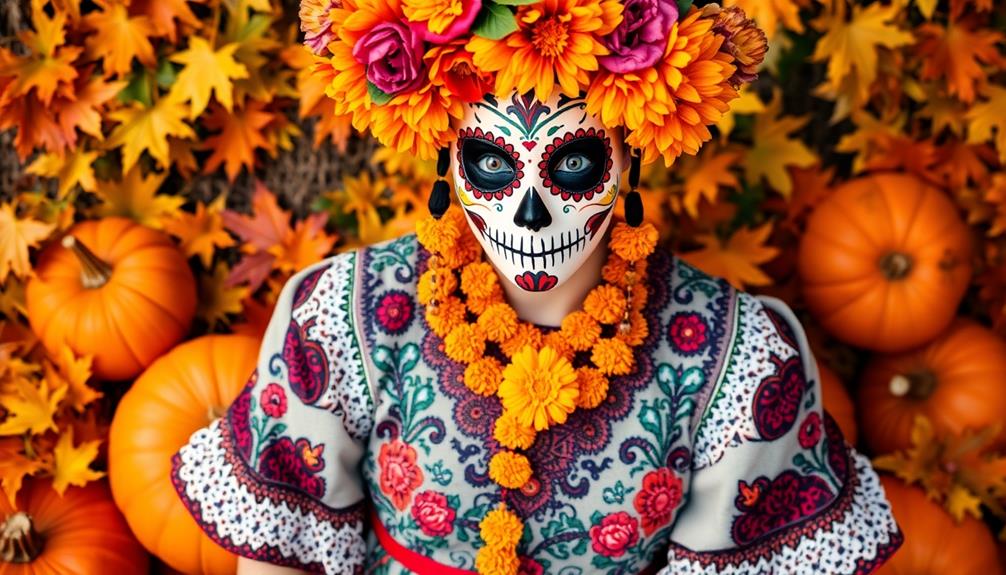
Halloween is the perfect opportunity to showcase your heritage through creative costume ideas that honor your roots. Think about incorporating traditional elements like patterns, colors, or symbols that hold significance in your culture. This way, your Halloween costumes reflect authenticity rather than novelty.
You might consider crafting a DIY costume that embodies characters from your culture's folklore or legends. This adds a unique, personal touch to your Halloween attire. Additionally, use culturally relevant accessories, such as jewelry or textiles, that represent your heritage without veering into stereotypes.
Another idea is to research historical figures from your culture and portray them respectfully. Highlighting their contributions not only educates others but also adds depth to your costume.
Teaching Kids About Culture
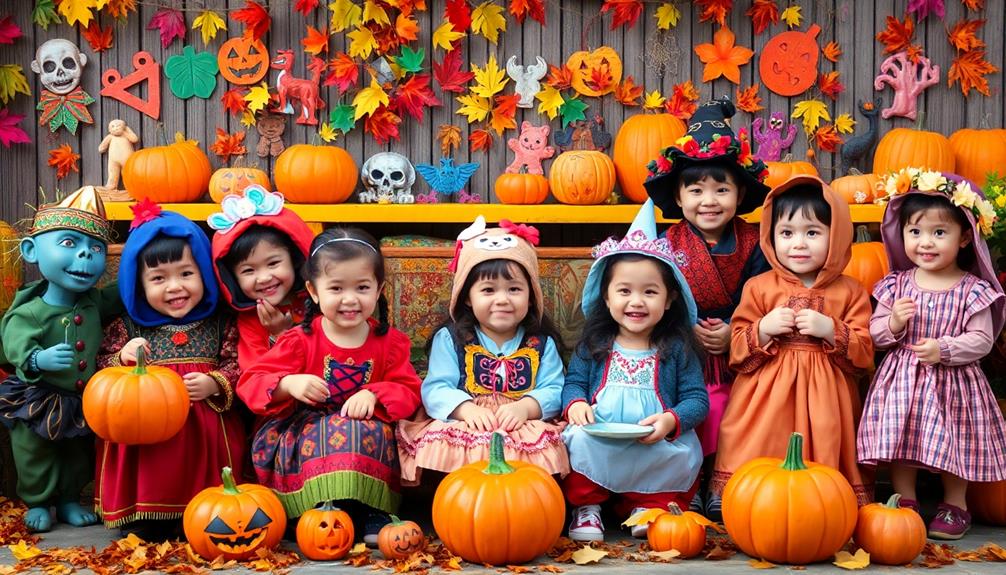
Teaching kids about their culture can be a rewarding experience that instills pride and a sense of identity. Engaging them in discussions about the significance of their heritage helps them appreciate cultural traditions and values.
When you share stories and legends from their culture, it not only enhances their understanding of diversity but also encourages respect and celebration of differences among people. This concept is similar to how a mother's love and legacy can be honored and remembered through special occasions, as seen in a loving tribute.
Incorporating cultural elements into Halloween costumes is a fantastic opportunity to educate your children about the meanings behind those elements. This approach promotes cultural appreciation rather than appropriation, teaching them to honor their roots.
Encourage your kids to research historical figures from their heritage. This exploration can provide them with a nuanced understanding of their culture and instill a strong sense of pride.
Utilizing diverse resources like books, podcasts, and community events can deepen their education on cultural sensitivity. By doing this, you're not just teaching kids about culture; you're also instilling the importance of respectful representation of their own and others' traditions.
Through these efforts, you empower your children to embrace their heritage while fostering a rich appreciation for the world's diverse cultures.
Resources for Cultural Education

To truly understand and appreciate cultural traditions, you can seek out educational workshops and events that focus on heritage.
Reading books about different cultures will also deepen your knowledge and help you choose costumes respectfully.
Online platforms for cultural exchange can connect you with diverse communities, fostering meaningful conversations about cultural sensitivity.
Educational Workshops and Events
When exploring the significance of cultural attire, participating in educational workshops and community events can be incredibly enlightening. These opportunities often focus on cultural sensitivity, helping you understand the importance of various symbols and fostering respect for diverse heritages.
By engaging in workshops, you can gain insight into traditional costumes and the stories behind them, making your Halloween costume more meaningful. Additionally, developing a deeper appreciation for effective relaxation techniques can enhance your overall experience during these events.
Community events, like cultural festivals and heritage days, typically include hands-on activities that teach attendees about traditional crafts and practices. These experiences allow you to appreciate the richness of different cultures while ensuring you're respectful in your costume choices.
Additionally, nonprofit organizations frequently host seminars that address cultural appropriation, providing valuable guidelines for respectful representation. Engaging with local cultural groups through discussions and activities not only enhances your understanding but also promotes awareness of your own heritage.
Lastly, don't forget to check online platforms and local libraries for documentaries and resources that explore cultural attire. By immersing yourself in these educational experiences, you'll be better equipped to celebrate your background respectfully this Halloween.
Books on Cultural Traditions
Exploring books on cultural traditions opens up a wealth of knowledge that can deepen your understanding of heritage and its significance. These resources reveal the importance of various cultural symbols and practices, helping you appreciate your background as you prepare for Halloween.
Consider delving into titles like "The Spirit of Halloween: A Cultural History" or "Celebrating Halloween: A Cultural History." These books provide insights into how Halloween has evolved across various cultures, encouraging a respectful approach to costume selection. For young readers, children's books like "Jingle Dancer" by Cynthia Leitich Smith can inspire creativity while teaching valuable lessons about heritage.
Here's a quick reference table to guide your reading:
| Book Title | Focus Area |
|---|---|
| The Spirit of Halloween | Cultural history of Halloween |
| Celebrating Halloween | Global Halloween celebrations |
| Jingle Dancer | Cultural storytelling for children |
| Festivals of the World | Diverse cultural traditions |
| Cultural Traditions Through Literature | Understanding heritage via books |
Engaging with these texts fosters respect for diverse traditions, guiding you to thoughtfully incorporate your heritage into your Halloween costume.
Online Cultural Exchange Platforms
In today's digital age, online cultural exchange platforms have become invaluable resources for anyone looking to deepen their understanding of diverse heritages. Websites like Global Citizen and Cultural Survival offer educational materials that promote appreciation for marginalized cultures.
Engaging with these platforms can help you navigate the complexities of cultural representation, much like understanding the divorce process requires knowledge of local laws and guidelines. You can explore free courses on platforms like Coursera and edX, focusing on cultural sensitivity, which can enhance your Halloween costume choices by ensuring they honor rather than appropriate those traditions.
Social media platforms like Facebook and Instagram host vibrant groups where you can connect with individuals from various backgrounds. These communities share stories, artwork, and discussions that can provide inspiration for your Halloween costume while respecting cultural significance.
Additionally, virtual workshops and webinars organized by cultural institutions feature guest speakers who offer firsthand insights into their practices and values.
Don't overlook community forums like Reddit, where specific subreddits focus on cultural exchange. You can ask questions, share experiences, and gather knowledge about different cultural traditions.
Celebrating Diversity in Costumes

When you choose a Halloween costume, consider embracing your personal heritage stories and the cultural symbols that connect you to your roots. Incorporating elements that reflect your background can make your costume not only unique but also educational.
DIY costumes can be a meaningful way to express your identity while ensuring you honor your background respectfully. For instance, you might incorporate traditional attire or motifs that celebrate your culture, which can be a great opportunity to share the significance behind them with others, similar to how one might support a partner ready for parenthood by fostering shared experiences.
Embrace Personal Heritage Stories
Celebrating your personal heritage through Halloween costumes can be a powerful way to express your identity and share your cultural roots with others. When you embrace personal heritage stories, you not only honor your background but also inspire pride and connection.
Start by researching traditional attire and symbols from your culture; this knowledge can help you create a costume that respects and represents your heritage authentically. By enhancing your cultural intelligence, you can better understand the significance of various cultural elements and incorporate them thoughtfully into your costume design high CQ predicts success.
Let your imagination run wild as you engage with family members to uncover ancestral stories. These narratives can spark unique costume ideas that reflect your personal history. Consider incorporating elements from folk tales, legends, or historical figures that resonate with you, as they can educate others about your culture's rich traditions and values.
DIY costume creation is a fantastic way to incorporate traditional colors, patterns, or motifs from your background. This approach promotes creativity while ensuring your representation remains respectful and avoids cultural appropriation.
Highlight Cultural Symbols Respectfully
As you plan your Halloween costume, it's important to highlight cultural symbols with respect and care. When considering elements from cultures like those of Native Americans, research their meanings and significance to make sure you're representing them appropriately.
For instance, understanding the Hopi Tribe's role in maintaining harmony can provide a deeper appreciation of their cultural symbols. Avoid reducing these rich traditions to stereotypes or caricatures, which can perpetuate harmful misconceptions.
Engaging with community members or cultural leaders can provide invaluable insights into how to incorporate these symbols respectfully. Their guidance fosters genuine appreciation, making certain your costume honors rather than exploits their heritage.
Consider educational resources, such as workshops or literature about Native American traditions. They can enhance your understanding of the symbols you wish to represent and promote inclusivity.
For example, if you're inspired by Native American attire, think about how to do it in a way that showcases respect, perhaps by focusing on the colors or patterns that hold significance rather than fully replicating traditional garments.
DIY Costumes With Meaning
Creating DIY costumes allows you to express your heritage while celebrating Halloween in a meaningful way. By incorporating traditional symbols, colors, or patterns, you promote appreciation rather than appropriation.
Understanding the importance of cultural representation is essential, especially when it comes to fostering awareness and respect for diverse backgrounds navigating divorce from a narcissist.
Here are some ideas to inspire your costume-making:
- Historical Figures: Dress as a prominent figure from your culture's history, using clothing styles and accessories that reflect their time and significance.
- Folklore Characters: Bring to life a character from a traditional story that embodies your cultural values, adding elements that highlight their traits.
- Authentic Materials: Use indigenous fabrics or techniques like weaving or embroidery to create an authentic costume that tells a deeper story.
- Family Involvement: Get your family involved in the costume-making process, allowing everyone to learn about the cultural traditions and their meanings.
As you celebrate Halloween, share the story behind your costume with others. This not only fosters awareness but also promotes understanding of your cultural background and its significance.
Incorporating Personal Touches
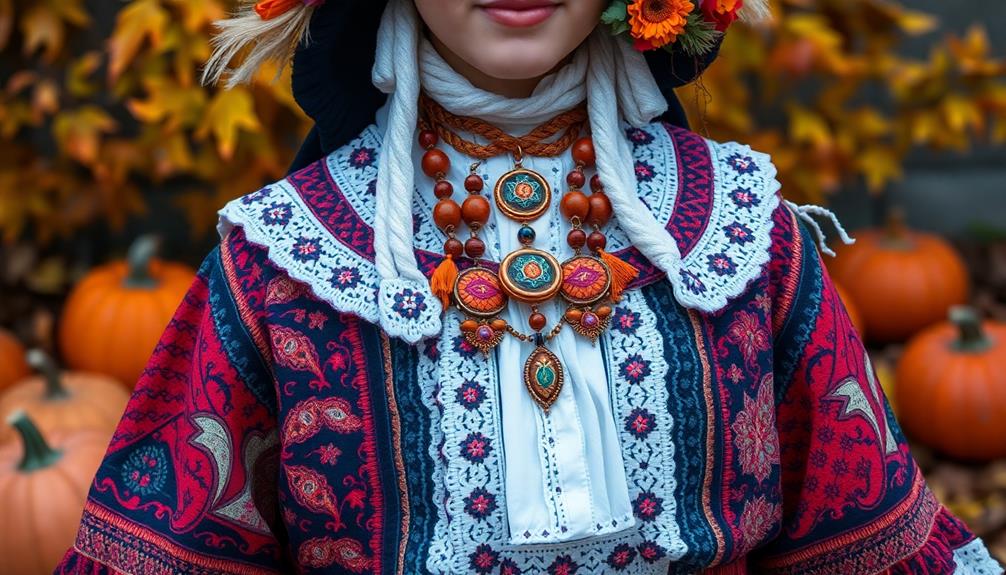
Often, adding personal touches to your Halloween costume can transform it into a meaningful expression of your heritage. To do this, make sure you incorporate family heirlooms or traditional garments that reflect your cultural background. These elements can celebrate your identity authentically and can be reminiscent of modern farmhouse decor trends that emphasize natural materials and vintage authenticity.
Consider creating a costume inspired by significant symbols or motifs from your heritage, like specific colors, patterns, or emblems. This approach not only showcases your identity but also respects the cultural significance behind those elements.
Don't forget to weave storytelling into your costume choice. You might choose characters from folklore or family stories that resonate with your heritage, adding depth and meaning to your look.
Using DIY techniques can also elevate your costume. Craft accessories or elements based on traditional crafts or artistic styles from your culture, ensuring a unique representation.
Frequently Asked Questions
What Is an Example of Cultural Appropriation in Halloween Costumes?
Cultural appropriation in Halloween costumes often appears when you wear a "Cowboys and Indians" outfit. It trivializes real histories, reduces cultures to stereotypes, and disrespects the experiences of marginalized groups. Avoid these choices for a thoughtful celebration.
How to Know if a Costume Is Cultural Appropriation?
Is your costume reducing a culture to a stereotype? To avoid cultural appropriation, evaluate the significance of the elements you're using, research their history, and engage with community perspectives to guarantee respect and understanding.
Is It OK to Dress up as a Native American for Halloween?
It's not okay to dress up as a Native American for Halloween. Such costumes often reduce a rich culture to stereotypes, disrespecting sacred symbols and perpetuating harmful narratives. Instead, consider celebrating your heritage in a respectful way.
What Makes a Halloween Costume Offensive?
Choosing a Halloween costume can feel like walking a tightrope. Costumes that mock or trivialize cultures reduce rich histories to stereotypes, perpetuating harm and disrespect. It's essential to contemplate the impact of your choices.
Conclusion
As you weave the threads of your heritage into your Halloween costume, remember it's not just a disguise; it's a vibrant tapestry that honors your roots. Every choice you make symbolizes a bridge between cultures, celebrating diversity and fostering understanding. Embrace the colors, patterns, and stories that define you, and share them with others. This Halloween, let your costume shine as a beacon of respect and pride, illuminating the beauty of your unique heritage for all to see.
